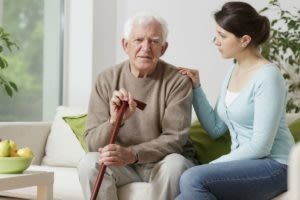Get Legal Help from Experienced Los Angeles Elder Abuse Lawyers
 According to the National Council on Aging (NCOA), about 1 in 10 Americans over the age of 60 have suffered from at least one type of elder abuse.
According to the National Council on Aging (NCOA), about 1 in 10 Americans over the age of 60 have suffered from at least one type of elder abuse.
There are too many silent stories of abuse and neglect: If you or your loved one was abused or neglected by a nursing home or assisted living facility in Los Angeles, you should contact a nursing home abuse lawyer as soon as possible.
Types of Elder Abuse
When someone with power over an elderly person intentionally harms them or puts them at risk of harm, their actions — or lack of action — are considered elder abuse. Elder abuse isn’t just one action or inaction, and can take many forms.
Knowing the different types of elder abuse can help you protect older adults — especially those living in nursing homes. It’s crucial to know about all the signs of nursing home abuse and types of elder abuse to prevent it from happening or stop it before severe harm occurs.
Physical Elder Abuse
Physical elder abuse is the intentional use of force against an elderly person.
Signs of physical elder abuse include:
- Cuts or scrapes
- Broken bones
- Bruises
- Burns
- Dislocated joints
- Head injuries
- Sprains
There are also signs beyond the injuries themselves that could mean an older person has suffered from physical abuse that include:
- A pattern of hospitalization for injuries or trips to different emergency rooms
- Delayed medical care for an injury
- Poor explanations for the elder’s injury from care providers
If an older person you love has been injured, ask caregivers how the injury happened and if it’s being treated promptly. Any uncertainty could mean that the injury stems from physical abuse.
Sexual Elder Abuse
Elder sexual abuse is forced or non-consensual sexual contact of any kind with an older adult. This includes sexual interactions with elders with dementia, Alzheimer’s, or other cognitive disabilities that prevent them from giving consent.
Warning signs of elder sexual abuse include:
- Bleeding, bruising or pain from genitals or inner thighs
- New sexually transmitted diseases or infections
- Pelvic injuries
Elder Neglect
Elder neglect happens when a caregiver fails to protect an older adult from harm, resulting in serious injuries or illnesses. Cases of elder and nursing home neglect are not honest accidents; rather, they are the result of carelessness or a lack of regard for an older person’s health.
Signs of elder neglect include:
- Dehydration and/or malnutrition
- Inadequate or unclean clothing
- Lack of food in facility
- Lack of needed medical aids
- Poor personal hygiene
- Unsanitary or unsafe facility
- Untreated infections or injuries
Neglect can lead to serious health problems, including bedsores, sepsis, and even death. Unfortunately, neglect is a high risk in nursing homes and assisted living facilities with staffing issues.
Elder Self-Neglect
Self-neglect happens when an elderly person is no longer able to meet their basic daily needs, and they suffer as a result.
An older person may be suffering from self-neglect if they can’t:
- Drink or feed themselves
- Dress themselves
- Maintain basic hygiene
- Maintain their home
- Manage financial affairs
- Properly address their medical needs
Many older adults struggle with letting go of their independence or acknowledging that they may not be able to care for themselves; however, if an older person has caregivers or lives in a nursing home, then self-neglect should not be occurring. In these cases, a caregiver may be committing neglect.
Elder Abandonment
Sometimes paired with neglect, elder abandonment happens when someone who cares for an older person intentionally deserts them. The former caretaker may leave the elder at a nursing home or other care facility without any arrangement, or with relatives who didn’t agree to become caregivers.
Emotional Elder Abuse
Psychological and emotional abuse are intentional acts that inflict mental pain, fear, or distress on an elder, and can take many forms.
Signs of emotional and psychological abuse in elders include:
- Appearing depressed, withdrawn, or scared
- Avoiding eye contact
- Different eating or sleeping patterns
- Isolation from friends and family
- Low self-esteem
- Mood swings/behavioral changes
Financial Elder Abuse
Elder financial abuse is the illegal, unauthorized, or improper use of an older individual’s resources.
Warning signs of elder financial abuse include:
- A pattern of missing belongings or property
- An elderly person who does not know or understand their financial situation
- Canceled checks or bank statements that go to someone else
- Changes to an older person’s power of attorney or bank accounts
- Eviction notices
- Evidence of unpaid bills
- Someone showing unusual interest in how much money an elder is spending
- Withdrawals the elder could not have made
What to Do If You Suspect Elder Abuse
- Call the police or 911 in an emergency
- Check in with your loved one: Some elders may be hesitant or scared to bring up their abuse, but they may confide in you with gentle prompting.
- Keep in regular contact with your loved one: Elders who are socially isolated are at a higher risk of abuse.
- Take accusations seriously: Too many people neglect to believe elders when they tell loved ones about their abuse — Do not take elder abuse accusations lightly and make sure they get the help they need.
Get Legal Help From an Elder Abuse Attorney
Placing a loved one in a nursing home is a difficult decision as the family puts trust into the facility. When that trust gets broken, the consequences can be severe, and can result in injury or even wrongful death.
Discovering that someone you love is the victim of abuse in a nursing home can be devastating.
Although there is no way to reverse the suffering elder abuse causes, seeking compensation with the help of a nursing home abuse lawyer can help you afford medical treatment that’s needed to start the healing process.
You have the right to take legal action against the facility or caregiver responsible for your elder loved one’s injuries and suffering.
Top-Rated Nursing Home & Elder Abuse Attorneys in Los Angeles
If you have seen signs of nursing home staff negligence or abuse while visiting your loved one in a nursing home, contact an experienced Los Angeles personal injury lawyer immediately.
If your loved one has been injured or neglected due to someone else’s poor behavior, you deserve an experienced elder abuse lawyer to fight passionately by your side.
Our dedicated attorneys at Grey Law have 25+ years of experience in handling nursing home abuse cases in Los Angeles courts and will protect your legal rights and help you recover the compensation you deserve.
For a free initial consultation and dedicated representation, please don’t hesitate to call (323) 857-9500 or email infogrewlawyer@gmail.com today.

